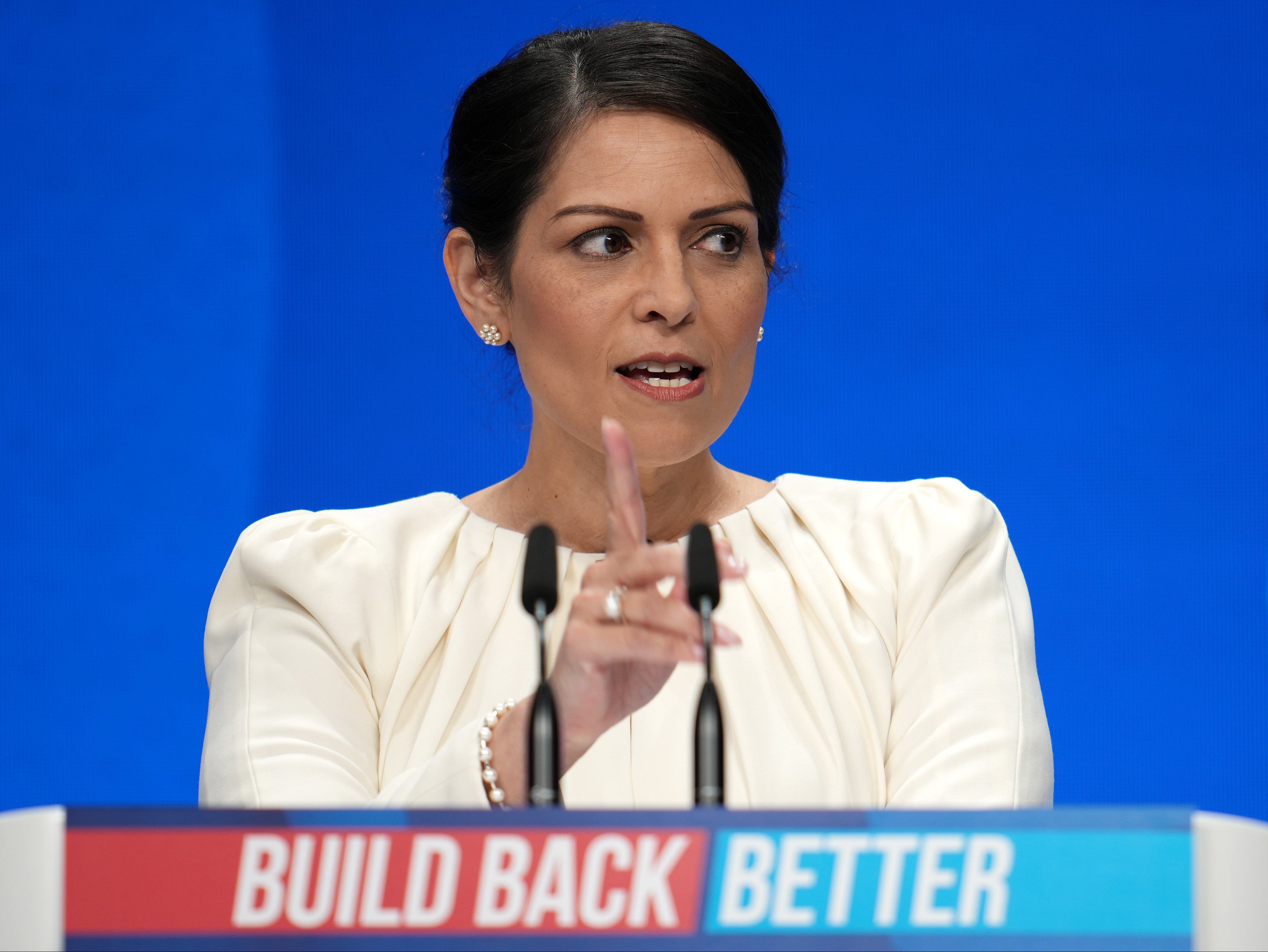Priti Patel has fallen hard in the eyes of the Tory faithful
The home secretary had little to offer in her speech about the impossible task of stopping small boats crossing the Channel, writes John Rentoul


Priti Patel has a special place in the demonology of anti-Tory Britain. She is assumed to be particularly right-wing, mainly because she supported the death penalty when she was selected as the Conservative candidate for Witham in Essex in 2006. And she is assumed to be extremely popular with grassroots Tory members across the country, and therefore a good indicator of what a terrible party she represents.
Most of this is quite wrong, although the Tory party may still be a terrible party. But she has equivocated about capital punishment so confusingly over the years that no one knows what her actual opinions are, and the idea that she is the darling of the Tory faithful is nearly two years out of date.
The pre-conference poll of Tory members carried out by Conservative Home, which all cabinet ministers study eagerly and jealously, found her net satisfaction rating was just 11 per cent. Only Grant Shapps, the transport secretary, on 3 per cent, is less popular than she is among party members – now that Gavin Williamson and Amanda Milling, who scored negatively, are no longer in the cabinet.
The decline and fall of Priti Patel has been one of the untold stories of this government. In January last year, after the Conservatives’ election victory, she was in the top four cabinet ministers with Boris Johnson, Sajid Javid and Michael Gove. She had a net satisfaction rating among party members of 80 per cent. (In other words, something like 85 per cent said satisfied, 5 per cent dissatisfied and 10 per cent didn’t know.) They did indeed adore her, because she is a working-class ethnic-minority female Brexiteer who gives as good as she gets when attacked by Labour MPs in the Commons.
Just the sort of person to be tough on crime and strict about immigration at the Home Office, which was why she was able to withstand the finding against her by the independent adviser on the ministerial code that she had bullied civil servants. Her support among party members enabled the prime minister to ignore that finding and keep her in post, a defiance of the unwritten conventions on such matters that enraged her critics more, reinforcing her status as a hate figure for rules-based liberals.
But the rage also obscured what was really happening, which was that she was falling out of favour. By last year’s virtual conference her net satisfaction score among party members was just 34 per cent, a mid-table ranking, while the new stars shone at the top: Rishi Sunak and Liz Truss.
Patel may have been the future once, but Sunak and Truss are the rivals for the post-Johnson succession now. The Conservative Home surveys also, less frequently, ask party members a harder-edged question. In August, as well as “are you satisfied or dissatisfied with” – on which Truss is now the official grassroots darling, on 83 per cent, with Sunak slipping to a mere 63 per cent – members were asked: “Who should be the next leader of the Conservative Party after Boris Johnson?” Sunak had a commanding lead in a large field, on 31 per cent to Truss’s 12 per cent. Patel came ninth, on 3 per cent.
The cause of Patel’s decline is not hard to guess. She devoted a large part of the second half of her speech today to immigration and asylum. But the Tory representatives who liked what she had to say in the early part of the speech about getting “these criminals”, as she described Insulate Britain protesters, off our motorways, noticed that she still didn’t have a solution to the issue of small boats crossing the Channel.
She complained about the endless appeals against refusals of asylum; she said “the system is collapsing”; and she said it wasn’t right that people should seek asylum in the UK if they are in France, “a safe country, one not riven by war or conflict”. She sounded like a Tory shadow home secretary berating a Labour government for being soft on abuse of the asylum system.
The only solution she could offer, apart from increasing the maximum punishment for people smuggling to a life sentence, was “new sea tactics, which we are working to implement, to turn back the boats”. Everyone knows that “working to implement” means failing to implement, because the Coastguard don’t want to do it, worrying that it is probably unlawful.
That is why some Tories have given up on Patel and are looking to Dominic Raab, the new justice secretary, who said in his speech today: “We will overhaul the Human Rights Act.” That is the act that incorporates the European Convention on Human Rights into British law, and against which Theresa May chafed when she was home secretary.
Raab didn’t tell us any more, possibly because he knows how difficult it would be to disown an international convention. But if he could solve the legal issue of Channel crossings, he could be the darling of the Tory grassroots at next year’s party conference.



Join our commenting forum
Join thought-provoking conversations, follow other Independent readers and see their replies
Comments